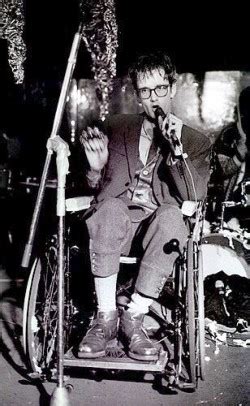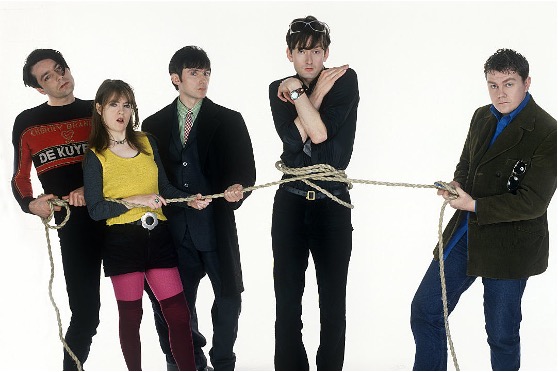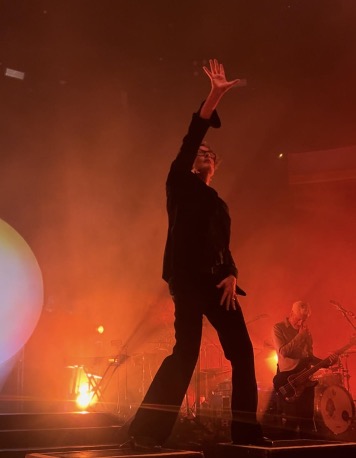You can’t buy community: The relevance of Pulp’s recent North American tour
If you combine a praying mantis, a thrifted 1970s disco suit, and a pair of Buddy-Holly-style glasses that never seem to fall off, you end up with British sex icon Jarvis Cocker, most regarded for his musical career as the frontman for Pulp. Cocker started the band in 1978 when he was just fifteen. He performed with Pulp around Sheffield for a couple of years and, for a brief period, appeared on stage in a wheelchair after falling out of a window trying to impress a girl in a failed attempt at a Spider-Man bit.

Jarvis Cocker in his wheelchair
Pulp’s music is a mish-mash of various elements of Britpop, disco, new wave, and glam rock, but there is one theme present throughout the bulk of their discography: the plight of the working class.
The band remained obscure for upwards of twelve years until their 1995 Glastonbury Festival performance catapulted them right into the U.K.’s heart, and their song “Common People” became an anthem for working-class people across the country.
“Common People” tells the story of Cocker meeting a woman at a bar. This woman studied sculpture at Saint Martin’s College, a famed art school in England, simply because she had too much money and time on her hands. She proceeds to let Cocker know that her father is rich, but wants to try living like people who are “common.” Cocker wrote this song about class tourism, which refers to wealthy people visiting working-class areas for entertainment.

Jarvis and the rich woman in the “Common People” music video, 1995
In typical Pulp fashion, Cocker makes fun of her throughout the song, saying:
But still, you’ll never get it right
‘Cause when you’re laid in bed at night
Watching roaches climb the wall
If you called your dad he could stop it all
He’s laughing at this woman. Everyone is laughing at this woman. She’s a tourist. She’s a joke. Even though Cocker did encounter her in a bar, she represents something larger. Wealthy people, celebrities, and even high-end brands are still pretending to be more humble and down-to-earth than they are for the sake of fitting in amongst others. While pretending to be poor is insensitive, the need to belong is an intrinsic part of all of us, and that’s what actually makes people relatable.
When I saw Pulp perform “Common People” at the Hollywood Palladium on their September North American tour, it felt just as powerful as their Glastonbury show. People weren’t just singing and dancing; they were entranced and empowered, screaming the words as a collective. It was sweaty and packed and hot and exhausting, but I became a part of something.

I don’t know what it felt like to go home after day two of Glastonbury, but going home after the Hollywood Palladium was pretty bleak. Traveling to L.A. was expensive, and then I came home to homework and work to catch up on while getting constant spam calls and texts about the upcoming presidential election on my phone.

Jarvis Cocker at the Hollywood Palladium 9/18/24
It seems as though the U.S. is more divided than ever before. This country has such a strong emphasis on individualism that I can’t help but think it’s tearing us apart, causing us to sacrifice our neighbors’ needs for our own and leave people behind when we should be trying to help those who don’t have the resources to help themselves. The power belongs to all the people, not to the money or only those who have it.
People enjoy concerts, sports games, classrooms, and sometimes work, among other things, because they provide us with a sense of community that is often difficult to find. Seeing Pulp live was surreal because from the second I got in line at the Hollywood Palladium, I knew I had something I could talk about with the other 3,999 people there, despite coming from a mountain town in Arizona, despite being younger than many of the other fans who had seen Pulp open for Blur in the early 1990s, despite all of the differences that could have kept me apart from the greater whole. We love Pulp and Pulp loves us and nothing else matters in a moment like that.
You can’t buy happiness, credibility, beauty, or common sense, according to some old Pulp posters. You can’t buy your way into a real community, either. Music provides a great common ground for those who are searching for a way to relate to others and maybe even feel understood, and that’s an incredible power often found within the arts.
The Pulp song “Mis-Shapes” tackles the idea of being pushed out of society based on being poor:
Brothers, sisters, can’t you see?
The future’s owned by you and me.
The future can only belong to us if we find ways to relate to each other. Many of us strongly connect to various musical outlets, whether that be through playing an instrument or regularly attending performances. Taking advantage of the musical resources on campus, such as taking classes or joining a club, can be a helpful catalyst in finding your NAU community.
Another effective way to belong is by getting involved in our democracy. Staying informed about the candidates and propositions on our upcoming ballots is an extremely impactful method to help empower people and let our local and federal politicians know what we want from them, even if we don’t have as much money as others may have.
When we make ourselves known by connecting to our community and lifting our voices, we can change the lives of those around us.

